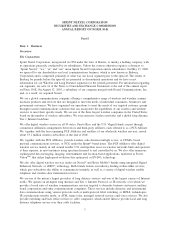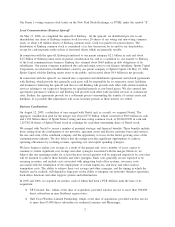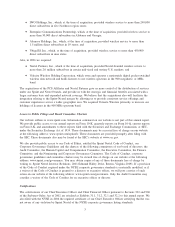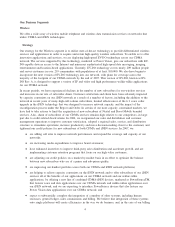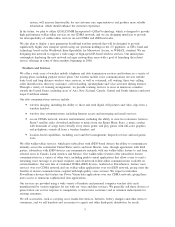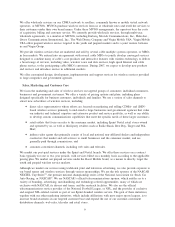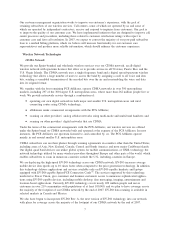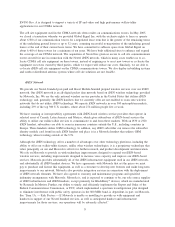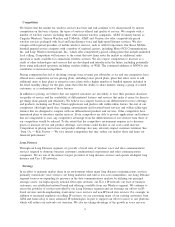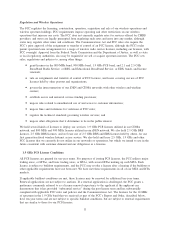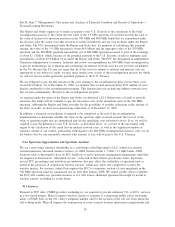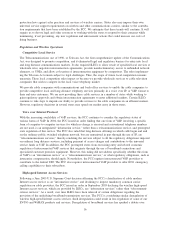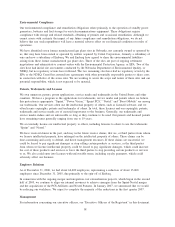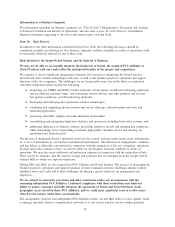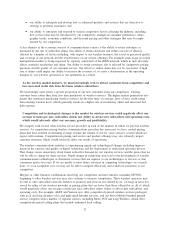Sprint - Nextel 2006 Annual Report Download - page 13
Download and view the complete annual report
Please find page 13 of the 2006 Sprint - Nextel annual report below. You can navigate through the pages in the report by either clicking on the pages listed below, or by using the keyword search tool below to find specific information within the annual report.Regulation and Wireless Operations
The FCC regulates the licensing, construction, operation, acquisition and sale of our wireless operations and
wireless spectrum holdings. FCC requirements impose operating and other restrictions on our wireless
operations that increase our costs. The FCC does not currently regulate rates for services offered by CMRS
providers, and states are legally preempted from regulating such rates and entry into any market, although
states may regulate other terms and conditions. The Communications Act and FCC rules also require the
FCC’s prior approval of the assignment or transfer of control of an FCC license, although the FCC’s rules
permit spectrum lease arrangements for a range of wireless radio service licenses, including our licenses, with
FCC oversight. Approval from the Federal Trade Commission and the Department of Justice, as well as state
or local regulatory authorities, also may be required if we sell or acquire spectrum interests. The FCC sets
rules, regulations and policies to, among other things:
kgrant licenses in the 800 MHz band, 900 MHz band, 1.9 GHz PCS band, and 2.1 and 2.5 GHz
Broadband Radio Service, or BRS, and Educational Broadband Service, or EBS, bands, and license
renewals;
krule on assignments and transfers of control of FCC licenses, and leases covering our use of FCC
licenses held by other persons and organizations;
kgovern the interconnection of our iDEN and CDMA networks with other wireless and wireline
carriers;
kestablish access and universal service funding provisions;
kimpose rules related to unauthorized use of and access to customer information;
kimpose fines and forfeitures for violations of FCC rules;
kregulate the technical standards governing wireless services; and
kimpose other obligations that it determines to be in the public interest.
We hold several kinds of licenses to deploy our services: 1.9 GHz PCS licenses utilized in our CDMA
network, and 800 MHz and 900 MHz licenses utilized in our iDEN network. We also hold 2.1 GHz BRS
licenses, 2.5 GHz BRS licenses, and we lease use of 2.5 GHz BRS and EBS licenses held by others, for our
first generation fixed wireless Internet access service. We also hold and lease 2.5 GHz, 1.9 GHz and other
FCC licenses that we currently do not utilize in our networks or operations, but which we intend to use in the
future consistent with customer demand and our obligations as a licensee.
1.9 GHz PCS License Conditions
All PCS licenses are granted for ten-year terms. For purposes of issuing PCS licenses, the FCC utilizes major
trading areas, or MTAs, and basic trading areas, or BTAs, with several BTAs making up each MTA. Each
license is subject to buildout requirements, and the FCC may revoke a license after a hearing if the buildout or
other applicable requirements have not been met. We have met these requirements in all of our MTA and BTA
markets.
If applicable buildout conditions are met, these licenses may be renewed for additional ten-year terms.
Renewal applications are not subject to auctions. If a renewal application is challenged, the FCC grants a
preference commonly referred to as a license renewal expectancy to the applicant if the applicant can
demonstrate that it has provided “substantial service” during the past license term and has substantially
complied with applicable FCC rules and policies and the Communications Act. The licenses for the 10 MHz
of spectrum in the 1.9 GHz band that we received as part of the FCC’s Report and Order, described below,
have ten-year terms and are not subject to specific buildout conditions, but are subject to renewal requirements
that are similar to those for our PCS licenses.
11


